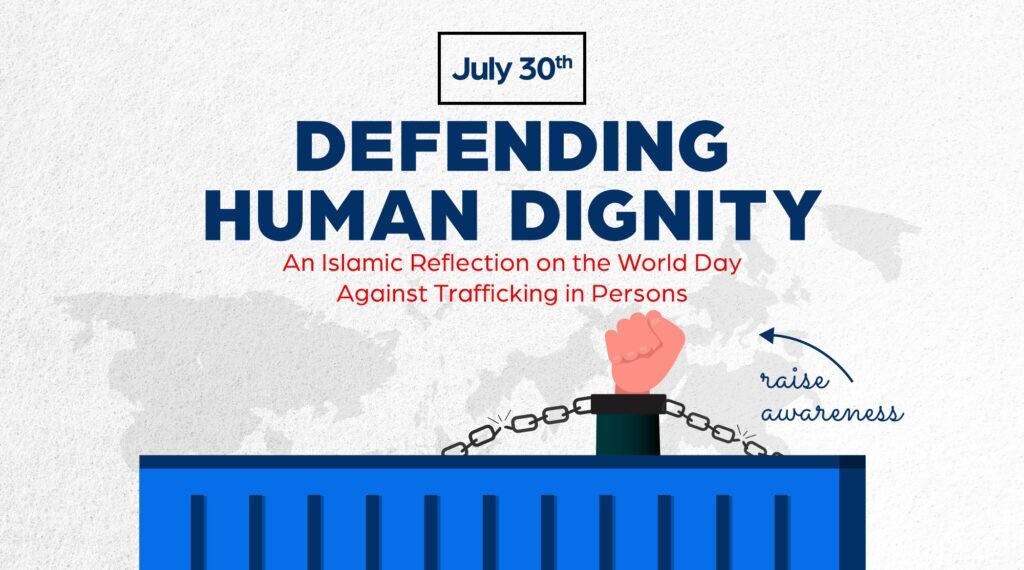Defending Human Dignity: An Islamic Reflection on the World Day Against Trafficking in Persons

July 30 is the World Day Against Trafficking in Persons, a day to reflect on the suffering of millions and to renew the global resolve to end this grave violation of human dignity.
Human trafficking has tragically become one of the fastest-growing and most devastating forms of transnational crime. Each year, millions of men, women, and children are subjected to forced labor, sexual exploitation, and other forms of modern slavery. Though tools and tactics may evolve, the core injustice remains unchanged: the ruthless exploitation of human vulnerability for power and profit.
It is estimated that over 27 million people are currently trapped in various forms of modern slavery around the world. This staggering reality demands urgent moral, legal, and humanitarian action. Ending human trafficking is not just a legal imperative — it is a spiritual and ethical responsibility that transcends borders, cultures, and faiths.
Let this day be more than a commemoration. Let it serve as a call to action for raising awareness, standing in solidarity with victims, and dismantling the systems that perpetuate such cruelty.
Islam’s Ethical Stance on Exploitation
Islam, in its essence, stands firmly against all forms of oppression. The Holy Quran and the teachings of the Ahl al-Bayt (pbut) — the purified household of the Prophet Muhammad (pbuh&hp) — offer profound and uncompromising guidance against coercion, abuse, and the commodification of human beings.
One of the clearest Quranic condemnations of sexual exploitation is found in the following verse: “Do not force your slave-girls into prostitution if they desire chastity, seeking the gains of worldly life. And if anyone compels them, then indeed God is Forgiving and Merciful to them” (24:33).
This verse prohibits coercion into sexual exploitation and affirms the dignity and agency of the oppressed. The phrase “if they desire chastity” emphasizes consent — a foundational ethical principle deeply rooted in Islam.
From a Shia perspective, any system that thrives on exploiting human weakness, whether economic, emotional, or physical, is not only unjust but a rebellion against the Divine Will.
Imam Ali (p) eloquently stated: “A person is either your brother in faith or your equal in humanity” [Nahj al-Balagha, Letter 53].
This timeless teaching rejects all hierarchies built on domination and affirms the intrinsic worth of every human being. Justice, then, is not a privilege for a few, but a universal right.
Imam Jafar al-Sadiq (p) further warned: “He who enslaves a free person, God will make the Fire his dwelling place” [Al-Kafi, vol. 5, hadith 5]
Even in historical contexts where slavery existed, the moral thrust of Islam — especially through the Imams of Ahl al-Bayt — was oriented toward liberation, manumission, and protection of human dignity. Coerced labor, forced displacement, and sexual exploitation stand in direct opposition to the ethical framework of Islam.
Our Responsibility
On this International Day Against Human Trafficking, let us, as a community of faith and conscience, reaffirm our commitment to defending the oppressed and challenging systems of injustice. Whether through education, advocacy, or direct support for survivors, our silence must never become complicity.
Let us remember the powerful Quranic command: “Do not consume one another’s wealth unjustly or send it [in bribery] to the rulers in order that [they might aid] you to consume a portion of the wealth of others while you know [it is unlawful]” [2:188].
May we strive to be among those who defend the sanctity of human dignity — not merely in word, but in principled and persistent action.

Leave a Comment:
You must be logged in to post a comment.